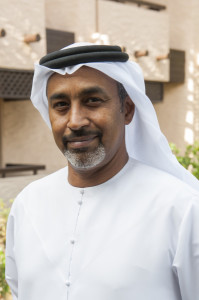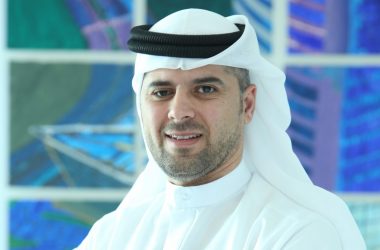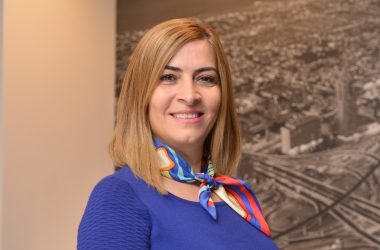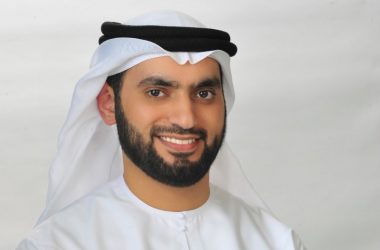 Dr. Zuhair Lardhi has been a witness to a lot of comings and goings in the Middle East IT industry. Less than 15 years ago, the IT Director for Khalifa Fund for Enterprise Development was working in a region where Microsoft’s presence was minimal. Since then he has gone on to oversee some of the biggest IT projects in the UAE. Born and raised in Abu Dhabi, Lardhi was initially a stranger to IT, instead putting his focus toward representing the UAE in basketball at junior level.
Dr. Zuhair Lardhi has been a witness to a lot of comings and goings in the Middle East IT industry. Less than 15 years ago, the IT Director for Khalifa Fund for Enterprise Development was working in a region where Microsoft’s presence was minimal. Since then he has gone on to oversee some of the biggest IT projects in the UAE. Born and raised in Abu Dhabi, Lardhi was initially a stranger to IT, instead putting his focus toward representing the UAE in basketball at junior level.
After leaving high school, he began a course in electrical engineering at the University of Minnesota in 1983, but upon his return to Abu Dhabi after the first year of his studies, it was clear to him that IT would shape the future. “My father arranged for me to work part time in the oil fields over the summer, and it struck me that there was no computerised automation as part of their process,” he says. “It was used solely for keeping financial records, and nothing else.” This realisation would prove to be one that would shape his career, “I saw IT as a new career path that would offer not only validity, but also serious demand. It was something I had to be involved with,” he says. He abandoned his electrical engineering studies, and started a fresh degree in computer science. Lardhi fondly recalls being given a unique opportunity whilst at university, “One of my professors took me under his wing and gave me the opportunity to work for six months in an IBM R&D team. It was a fantastic taste of the professional world.”
He graduated in 1989, and moved back to Abu Dhabi, where he joined oil exploration firm ADCO as an Analyst Programmer. A lot has changed in the regional IT scene since then, but Lardhi has not forgotten the faith that was placed in him by his former ADCO boss, “I owe a lot to that man,” he says. “He always challenged me, he entrusted me with project management and delivery of IT systems at the age of 26, and that had a big impact on my career. Having said that, I certainly suffered a lot of sleepless nights at the time!” With his mentor’s help, he progressed quickly in the company, being promoted to several different roles, before he joined computer giant Microsoft – whose Middle East presence was in its infancy—in 1999.
Lardhi compares the move to Microsoft to “arriving on a different planet.” Serving local and federal government contacts, as well as figures in the oil and gas industry, his experience as Business Development Manager at the PC giant was pivotal, “Working at Microsoft really allowed me to see things from the other side of the table. I got excellent experience working the sales and marketing side of things, and it gave me a better understanding of what customers want. It made me realise the business opportunities of IT.” Given the huge technological progress the UAE has seen in the last 15 years, it seems surreal that Microsoft had no presence in Abu Dhabi at the time. Lardhi fondly recalls the birth of Microsoft’s presence in the Middle East, and his role in establishing it: “Microsoft’s first Middle East office was in Dubai, and that was managed by Istanbul. I was certain that they should open one in Abu Dhabi. I made my feelings clear to my superiors, and once they had gone on to open the Abu Dhabi office, more followed in Kuwait and Lebanon.”
Much like his stint at Microsoft, Lardhi’s next role, IT Manager at Abu Dhabi Water and Electricity Authority (TRANSCO), would provide him with a culture shock. The company was undergoing privatisation at the time of his arrival, and he says the transition left the firm’s IT department in chaos. “When I arrived IT was a new concept there; servers, laptops and emails did not exist. TRANSCO had to transform itself from being a government entity into a profitable organisation, and so IT was a secondary consideration.” However, his five year tenure can be labelled a success after a variety of progressive project deliveries, “In my time there we successfully implemented ERP, storage management and infrastructure for the whole utilities sector, so in that respect my time there was a success,” he says.
During his tenure at TRANSCO, Lardhi found time to fulfill a long-running ambition to continue his studies. He began a master’s degree in Quality Management, studying after his daily hours at the office were complete. “I had always wanted to do a master’s degree whilst studying for my BSc,” he says. “I felt it was important to continue learning, and that’s something I still feel is essential for me today.”
After a five year stint at TRANSCO, the company’s IT operations were outsourced to Injazat Data Systems on a 10-year contract, and they took Lardhi with them as their IT Manager. There he was responsible for dealing with outsourced staff and delivering Injazat’s service for his form employers. “My role at Injazat entailed a lot of work in dealing with quality control,” he says. “I was responsible for monitoring a lot of contracts and ensuring they were properly delivered.”
Lardhi’s thirst for knowledge would not evade him during his time at Injazat. He took on the additional pressures of studying for a PHD course in Organisation Leadership, and it was a decision that he did not take lightly. “I had done the master’s, but a PHD was a completely different challenge,” he says. “I had consulted with my family before as to whether it was a good choice, but they supported me so I did it. There were times when it really affected my performance at work and at home; it was a constant extra weight. It was challenging, but when I earned the qualification it was worth the hard work.”
In the process of completing his impressive balancing act, Lardhi caught the eye of Injazat. The company had been delivering projects for Aldar Properties, and in 2008 his work paid off when he was recommended for the role of Group IT Director for the estate development firm. The move ran parallel to his early days at Microsoft, the change in work culture serving as an eye-opener, “Operations there were scattered,” he recalls. “There were a lot of contracts, and it was difficult to say where some had come from.” Nonetheless, he set about implementing a widespread wireless network which covered all Abu Dhabi and Al Ain development projects. The wireless P-P network he established supported projects including Al Souq Towers, Yas Island and five schools situated in Abu Dhabi. He was also charged with implementing the IT requirements for the Emirate’s Ferrari Park, whose opening coincided with the first Grand Prix event in 2009.
In 2013 Lardhi joined Khalifa Fund for Enterprise Development—an organisation established to finance local entrepreneurs in Abu Dhabi—as IT Director. The fund provides training, development, data and consulting services, and Lardhi takes personal pride in working for the not-for-profit group. “It’s really satisfying to lead projects that do real good to people’s lives,” he says. “We’re able to provide resources to those who have suffered difficulties, and I believe we make a difference. For example, we’ve set up kiosks at Etihad Airlines which serve as a great advert that we’re approachable and open to help people. Our Ishraq initiative helps those who have recovered from an addiction at the National Rehabilitation Centre, while Amal supports special-needs Emiratis.”
Unsurprisingly, Lardhi has remained grateful to his family for the support he received whilst studying for his master’s degree and PHD, “My wife and parents were an inspiration to me throughout that time,” he says. “They were incredibly patient with me and I will always remember that. A lot of people in life come and go, but they’ve always been there for me. In life I value honesty and hard work, but above all else team work.”





